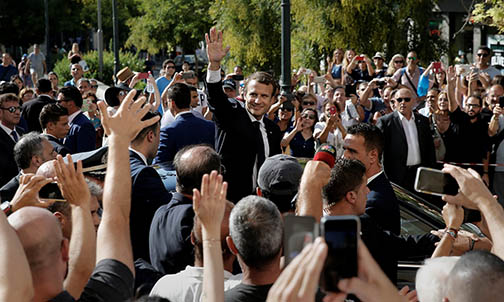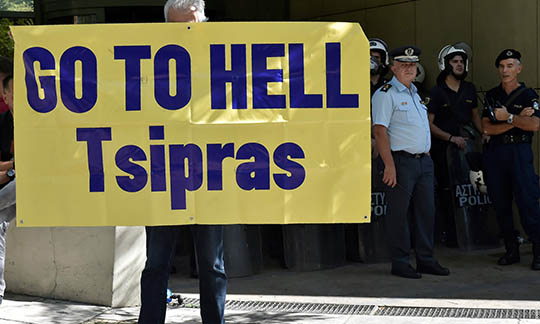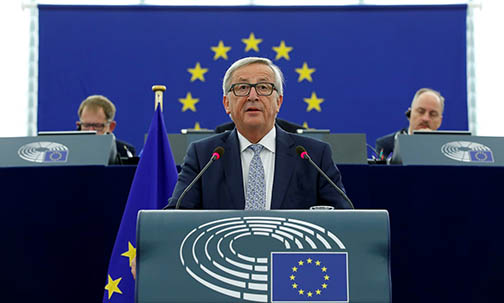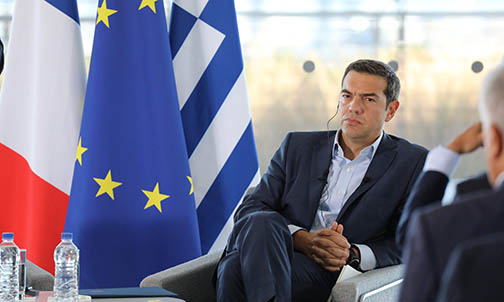

The eurozone may be back on its feet. But is Greece?
Helena Smith
Jean-Claude Juncker believes Europe is starting to recover at last. But the picture from the union’s most fallible economy is very mixed
French President Emmanuel Macron declared Greece’s prolonged crisis was over in his Athens speech. Photograph: Alkis Konstantinidis/Reuters
Is the eurozone on the mend? Jean-Claude Juncker certainly thinks so. The EU president was upbeat in Brussels last week as he gave his annual state-of-the-union address, proclaiming that “the wind is back in Europe’s sails”.
Juncker’s optimism appeared to match the view from Greece, the currency bloc’s problem child. In Athens only the previous week, the visiting French president, Emmanuel Macron, had been even more enthusiastic, declaring against the backdrop of the Acropolis that Greece’s prolonged crisis was over, and that therefore Europe’s was too.
Macron’s finance minister, Bruno Le Maire, went further, calling the Greek prime minister, Alexis Tsipras, “a real leader [who] works for the common good, a prime minister who works with great courage”.
But if progress on Greece’s privatisation programme is anything to go by, the eurozone’s most troubled economy is still in the foothills of recovery. Despite signs of resurgence – at 0.7%, Greece recorded two consecutive quarters of growth this year for the first time since 2006, and made a successful test return to the markets – foreign sell-offs have been plagued by red tape and political resistance.
To the delight of many, nonetheless, Tsipras, the man who set Europe ablaze with Marxist ideology and anti-austerity rage back in the heady days of January 2015, is becoming more pragmatic by the day. The 42-year-old’s embrace of the free-market policies he once abhorred was cemented last Sunday, when he announced that he would personally oversee the foreign investment drive now viewed as key to curing the curse of Greece’s unemployment rate. More than a fifth of the country’s working-age adults are out of work.
A worker from an Eldorado gold mine in northern Greece protests against the threatened suspension of the company’s investment in Greece, outside the environment ministry in Athens. Photograph: Louisa Gouliamaki/AFP/Getty Images
During his annual economic policy speech, before an audience of mostly Chinese investors, the former firebrand promised to create a taskforce with the sole purpose of resolving the bureaucratic hurdles that are often the greatest impediment to business in Greece. Moreover, it was a body he would head.
“It is obvious. Our policies have changed radically, ” says Stergios Pitsiorlas, the deputy economy and development minister, whose airy office is visited daily by bankers, hedge-fund managers and industrialists jockeying for bargains. “Being leftwing doesn’t mean you are also a fool. It doesn’t mean, in the words of Lenin, that we are useful idiots. Let’s speak seriously. Those who complain that Greece is being sold off, that Greece will lose out, don’t know what they are talking about.”
Tall, bearded and bespectacled, Pitsiorlas is the point man in Athens’s attempt to raise €60bn (£53bn) through privatisations – sales that, increasingly, have become the focus of international creditors keeping the debt-stricken country afloat. In what has been called the most ambitious sell-off in modern European history, assets ranging from public utilities and transport companies to marinas and hotels are up for grabs.
But amid growing tensions between foreign investors and government officials – and between European investors and the Chinese – Pitsiorlas also is an exception to the hostility that other ministers in Tsipras’s Syriza-led government are exhibiting to sales many consider to be a crime.
On Monday, as problems mounted, tensions worsened dramatically when the Canadian mining company Eldorado Gold threatened to end its €3bn investment in Greece, citing delays in permits from the development ministry. In a move aimed at eliciting maximum embarrassment from the government, it issued the threat less than 48 hours after Tsipras declared that “Grinvestment” had replaced fears of “Grexit” and was now the mot du jour. Violent protests erupted as employees demonstrated outside the ministry in Athens. Eldorado is the country’s biggest foreign investor, and its mines in northern Greece will provide 2,000 jobs.
On Tuesday, the country’s transport minister, Christos Spirtzis, upped the ante, delivering a withering indictment of the operational skills of Fraport, a German consortium managing 14 regional airports, many on popular tourist islands, under a 40-year concession. Not only had the consortium not moved ahead with modernisation of the facilities, it had failed to maintain basic standards of cleanliness, he said. “We even have problems with sanitation in the WCs, which are worse than can ever be remembered.”
European commission president Jean-Claude Juncker was upbeat about the eurozone during his state-of-the-union address. Photograph: Christian Hartmann/Reuters
The accusation drew a strong rebuke from Fraport, which claimed master plans submitted for infrastructure upgrades had yet to be approved.
On Wednesday, as officials rushed to start the process of providing Eldorado with permits, uncertainty over the redevelopment of Athens’s former Hellinikon airport peaked when the powerful Archaeological Council postponed a long-awaited decision over whether the site should be redeveloped at all. At €8bn, it would be Europe’s biggest foreign investment.
“What all of these things do is send a terrible message to investors,” Athens’s mayor, Giorgos Kaminis, told the Observer. “The left is usually associated with being progressive, but in this case we are talking about a left that is deeply conservative – state ideologues that don’t really want progress at all.”
Kaminis will run for the leadership of a new, unified centre-left party that will bridge the space between Syriza and its main opposition, New Democracy. Pasok, Greece’s old social democratic party, is associated exclusively with the country’s economic meltdown and was pulverised when the debt crisis erupted in late 2009.
With the ardently pro-European, reform-minded Kaminis believed to be a shoo-in, Tsipras is watching nervously – and, in the process, also shifting ground.
Privatisations are central to completion of a new round of bailout negotiations with the EU and International Monetary Fund. Greece’s third, €86bn, rescue programme is due to end next summer and Tsipras has made a clean exit from it, which would herald Athens’s return to the markets, an overarching goal. But hurdles lie ahead. On Friday, eurozone finance ministers warned that continued persecution of the country’s former statistics chief, Andreas Georgiou, could dent international confidence and derail chances of recovery. Officials also raised the prospect of fresh austerity should Greece fail to hit the primary surplus target of 3.5% – a prospect made likely by a huge shortfall in tax revenues.
Greek prime minister Alexis Tsipras is becoming more pragmatic by the day. Photograph: Ludovic Marin/AFP/Getty Images
But in a week when the Italians finally took control of Greece’s state-owned train network (acquired by Italy’s own state operator for a paltry €45m) Pitsiorlas is optimistic. He cites the takeover of Piraeus port by the Chinese shipping conglomerate Cosco as an example of what privatisations can bring: “They will make it the biggest port in Europe and that will boost other professions, create thousands of jobs, revitalise shipyards, which they are also looking at, pave the way to better trains, roads and logistic centres, and trigger development and growth.”
In five years, he enthuses, Greece will be a very different place, cosmopolitan and vibrant.
“There are rules which need to be observed but ultimately everything will be solved,” he insisted, referring to the obstacles Eldorado and others have encountered. “A miracle will happen. There will be huge change … but the state can’t do it alone, the private sector has to be involved.”
Ever since Athens’s debt crisis exploded, successive governments – hit by fury over pay cuts, pension reductions and tax rises – have tried to claw back support by resorting to a narrative of recovery and success. With Syriza trailing by as much as 16 percentage points in the polls, Tsipras is proving to be no different, emphasising the seven-point drop in unemployment since 2015, a 7.5% jump in exports and a bumper year for tourism. Problem-plagued foreign investment efforts puncture the narrative, with many believing that recovery can be assured only when the Greek prime minister tackles entrenched resistance among his own hard-left cadre. Youth joblessness is still running at 45%, while the country’s €300bn debt burden is an unsustainable 180% of GDP.
But unlike his predecessors, Tsipras has received unprecedented support from fellow EU leaders. They are aware that only a leftist could pass the gruelling austerity asked of Greeks, and are now desperate to prove the point that, far from being in inexorable decline, Europe is bouncing back – with its weakest member still on board.
The Observer



